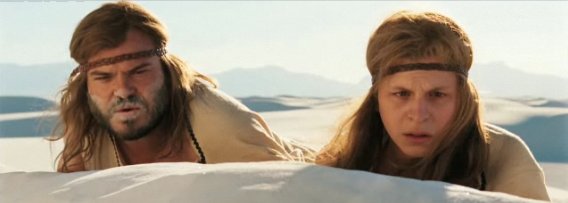
The “biblical comedy” Year One comes out next month, and at least two websites posted new stories last week describing their visits to the set last year; one of them also posted several interviews with the director and members of the cast.
The main report at ComingSoon.net focuses on costumes, production design and the like – though it also notes, without quite saying so, that the film seems to have shuffled the chronology and geography of the Book of Genesis somewhat. Describing what they saw in the city of Sodom, they note that the set included something that was “meant to represent the Tower of Babel,” with scaffolding and extras playing slaves who are working on the tower’s construction.
The individual interviews bring up some interesting subjects, too. For example, co-stars Jack Black and Michael Cera talk about how their improvising has been affected by the fact that they aren’t allowed to use certain words and expressions that might sound too “modern”, like “textbook” and “bathroom” and “dodged a bullet”.
Meanwhile, David Cross reveals that his character, Cain, will have a considerably bigger role in this film, beyond simply killing his brother Abel:
CS: How did you put a comedic twist on playing Cain?
Cross: Well, unfortunately we shot those scenes already before I got my Bible. [everyone laughs] I just had fun being duplicitous. And mean. And nasty. And murderous. And conniving. And I end up ratting Jack and Michael out. I get promoted because of it. And it’s fun. I mean anytime you get to do that. I usually only get cast in two things. It’s either nerdy guy or sarcastic, nasty guy, but this is kind of a new twist on sarcastic, nasty guy, so I like it.
Finally, director Harold Ramis discusses some of the ideas behind the movie:
CS: You mentioned “Life of Brian” before. We were talking earlier about other great Biblical comedies like “History of the World Part I” or “Wholly Moses!,” which is a bit of a forgotten film. What’s going to differentiate this movie from some of the other classics? What’s your spin on it, basically?
Ramis: Well (chuckles) our spin is that “Wholly Moses!” was awful! [laughter] And that’s well forgotten, and “History of the World” I looked at again and it’s very old school. It’s very Catskills. It isn’t really expressing any kind of philosophy. Whereas the Python films do contain some kind of social commentary, and there’s a sense of playing with real literature with the Pythons, and that’s sort of what I was going for here. I’ve been looking at the Old Testament for a very long time, starting as a Hebrew school student, and just thinking about it every year. I’ve had some really enlightening contact with a progressive rabbi that I know, and these ideas, suddenly after 9/11, seem much more important. The role that religion plays in the world, the power of Fundamentalism over people’s lives. I thought, maybe I can take all of those ideas I had about the early world and use them in service of this idea. And to somehow find an interpretation of Genesis that would hook directly into where we are today. All our problems go all the way back right to the beginning.
CS: Do you think that the Old Testament is inherently funnier than the New Testament?
Ramis: I don’t know about funnier, but I was explaining to someone that the New Testament is a much better narrative, that’s why it’s more popular, because it’s like a hero’s journey. It’s one character, the story takes place in one person’s lifetime, it has a beginning, a middle and an end, and a redemption. You look at the Old Testament, and it’s one dysfunctional family after another. Somehow, when we tell Bible stories to kids, they turn out to be little morality tales, but they’re not! You read the Old Testament, and people, they’re more than flawed; they do some terrible things to each other, and there are no happy endings; there are no resolutions. These stories just go on and on in the Old Testament. I noticed that, and I also noticed that they’re all journeys in the Old Testament. Everyone’s on a journey; they’ve either been expelled from somewhere or exiled or they’re fleeing from something or they’re out seeking something in the world. When I thought about doing the Old Testament, there was no single story that has a good enough arc to be a movie, unless you’re doing “The Ten Commandments” again. So I thought I could take all these stories from the early part of Genesis and smash them into one story. I’m sure most of our young audience will not know the difference anyway. (laughter) So it was a way to try and forge a narrative out of a bunch of Genesis material.
Cinematical also has a set-visit report, but it is much shorter and doesn’t get anywhere near as in-depth.









